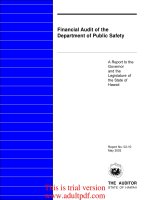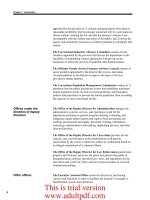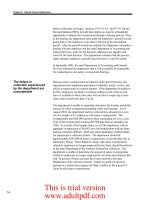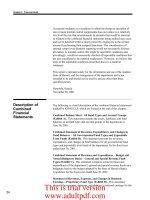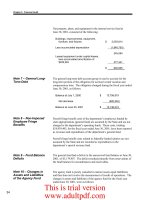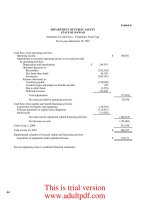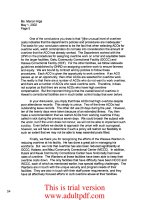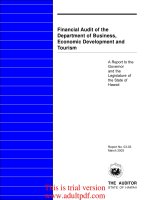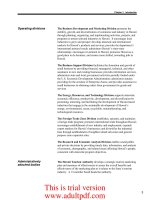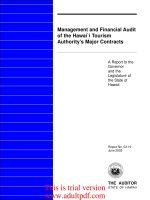Financial Audit of the Housing and Community Development Corporation of Hawaii A Report to the Governor and the Legislature of the State of Hawaii Report No. 01-14 September 2001_part1 doc
Bạn đang xem bản rút gọn của tài liệu. Xem và tải ngay bản đầy đủ của tài liệu tại đây (42.93 KB, 11 trang )
Financial Audit of the Housing
and Community Development
Corporation of Hawaii
A Report to the
Governor
and the
Legislature of
the State of
Hawaii
THE AUDITOR
STATE OF HAWAII
Report No. 01-14
September 2001
This is trial version
www.adultpdf.com
Office of the Auditor
The missions of the Office of the Auditor are assigned by the Hawaii State Constitution
(Article VII, Section 10). The primary mission is to conduct post audits of the transactions,
accounts, programs, and performance of public agencies. A supplemental mission is to
conduct such other investigations and prepare such additional reports as may be directed by
the Legislature.
Under its assigned missions, the office conducts the following types of examinations:
1.
Financial audits
attest to the fairness of the financial statements of agencies. They
examine the adequacy of the financial records and accounting and internal controls, and
they determine the legality and propriety of expenditures.
2.
Management audits
, which are also referred to as
performance audits
, examine the
effectiveness of programs or the efficiency of agencies or both. These audits are also
called
program audits
, when they focus on whether programs are attaining the objectives
and results expected of them, and
operations audits
, when they examine how well
agencies are organized and managed and how efficiently they acquire and utilize
resources.
3.
Sunset evaluations
evaluate new professional and occupational licensing programs to
determine whether the programs should be terminated, continued, or modified. These
evaluations are conducted in accordance with criteria established by statute.
4.
Sunrise analyses
are similar to sunset evaluations, but they apply to proposed rather than
existing regulatory programs. Before a new professional and occupational licensing
program can be enacted, the statutes require that the measure be analyzed by the Office
of the Auditor as to its probable effects.
5.
Health insurance analyses
examine bills that propose to mandate certain health
insurance benefits. Such bills cannot be enacted unless they are referred to the Office of
the Auditor for an assessment of the social and financial impact of the proposed
measure.
6.
Analyses of proposed special funds
and existing
trust and revolving funds
determine if
proposals to establish these funds are existing funds meet legislative criteria.
7.
Procurement compliance audits
and other
procurement-related monitoring
assist the
Legislature in overseeing government procurement practices.
8.
Fiscal accountability reports
analyze expenditures by the state Department of Education
in various areas.
9.
Special studies
respond to requests from both houses of the Legislature. The studies
usually address specific problems for which the Legislature is seeking solutions.
Hawaii’s laws provide the Auditor with broad powers to examine all books, records, files,
papers, and documents and all financial affairs of every agency. The Auditor also has the
authority to summon persons to produce records and to question persons under oath.
However, the Office of the Auditor exercises no control function, and its authority is limited to
reviewing, evaluating, and reporting on its findings and recommendations to the Legislature and
the Governor.
THE AUDITOR
STATE OF HAWAII
Kekuanao‘a Building
465 S. King Street, Room 500
Honolulu, Hawaii 96813
This is trial version
www.adultpdf.com
The Auditor State of Hawaii
OVERVIEW
Financial Audit of the Housing and Community Development
Corporation of Hawaii
Report No. 01-14, September 2001
Summary
4
Recommendations
and Response
The Office of the Auditor and the certified public accounting firm of KPMG LLP
conducted a financial audit of the Housing and Community Development
Corporation of Hawaii, State of Hawaii for the fiscal year July 1, 1999 to June 30,
2000. The audit examined the financial records and transactions of the corporation;
reviewed the related systems of accounting and internal controls; and tested
transactions, systems, and procedures for compliance with laws and regulations.
We found deficiencies in the financial accounting and internal control practices of
the corporation. These deficiencies included the corporation’s inadequate planning
for the implementation of its new information system that resulted in numerous
delays and additional costs to the corporation. The corporation still does not have
an adequate understanding of the problems and has not formulated a strategic plan
to expedite completion of the system implementation. As a result, the corporation
is unable to estimate the expected completion date of the project.
The corporation is not timely in its execution of some contracts resulting in the
execution of a design consultant contract 23 months after the funds became
available. Also, corporation management has failed to implement internal control
procedures to ensure the accuracy of the calculation of the final operating subsidy
from the federal government and the reconciliation of the final calculation to the
estimated operating subsidy.
An extremely large number of applicants are on the waiting list for low-income
housing and tenant rental assistance programs. At the rate at which the corporation
is currently placing applicants in housing, a waiting period of two to seven years
is likely. We also found that a required report was not submitted to the U.S.
Department of Housing and Urban Development within the prescribed deadline,
which could have resulted in a “freeze” of federal financial assistance. In addition,
we found that there is an inadequate segregation of duties over the corporation’s
petty cash fund.
We recommend that the corporation assess the status of the implementation of the
new information system, identify the causes of the problems associated with the
implementation, and develop a strategic plan to meet the objectives of the
implementation. The corporation should meet with Memory Lanes Systems Inc.
and develop a work plan for completion of the information system implementation
and should assign a project manager to oversee and monitor the project. The
corporation should assess liquidating damages of $100/day against Memory Lanes
Systems Inc. The corporation should also develop a contingency plan should
problems arise and deadlines be missed.
This is trial version
www.adultpdf.com
Report No. 01-14 September 2001
Marion M. Higa Office of the Auditor
State Auditor 465 South King Street, Room 500
State of Hawaii Honolulu, Hawaii 96813
(808) 587-0800
FAX (808) 587-0830
The corporation should complete capital improvement projects in a timely manner
and communication with the Board of Directors should be improved. The
corporation should implement sufficient internal control procedures to ensure that
the calculation of the actual operating subsidy is proper. Current and future
projects should be monitored to ensure that they are efficiently and effectively
completed; methods should be developed to spur facilitated developments and
assist in the placement of applicants in tenant rental-assisted units; and staffing
workloads and processes should be reviewed to ensure efficiency and effectiveness.
Also, HUD reporting requirements should be adhered to and staff who are
involved with the completion of HUD reports should be made aware of the
significance of time deadlines. Finally, segregation of duties over the petty cash
process could be improved.
The corporation generally agrees with most of our findings and recommendations.
The corporation also indicated that it has implemented or are in the process of
implementing all of our recommendations.
This is trial version
www.adultpdf.com
Financial Audit of the Housing
and Community Development
Corporation of Hawaii
Report No. 01-14
September 2001
A Report to the
Governor
and the
Legislature of
the State of
Hawaii
Conducted by
The Auditor
State of Hawaii
and
KPMG LLP
THE AUDITOR
STATE OF HAWAII
Submitted by
This is trial version
www.adultpdf.com
Foreword
This is a report of the financial audit of the Housing and Community
Development Corporation of Hawaii, State of Hawaii for the fiscal year
July 1, 1999 to June 30, 2000. The audit was conducted pursuant to
Section 23-4, Hawaii Revised Statutes, which requires the State Auditor
to conduct postaudits of all departments, offices, and agencies of the
State and its political subdivisions. The audit was conducted by the
Office of the Auditor and the certified public accounting firm of KPMG
LLP.
We wish to express our appreciation for the cooperation and assistance
extended by officials and staff of the Housing and Community
Development Corporation of Hawaii, State of Hawaii.
Marion M. Higa
State Auditor
This is trial version
www.adultpdf.com
v
Table of Contents
Chapter 1 Introduction
Background 1
Organization 2
Objectives of the Audit 5
Scope and Methodology 5
Chapter 2 Internal Control Deficiencies
Summary of Findings 7
Numerous Problems Have Plagued Implementation
Efforts for the New Information System 8
Recommendations 11
Capital Improvement Projects of $9.5 Million
Remain Incomplete After Three Years 11
Recommendations 13
Amounts Due From HUD Are Underreported 13
Recommendation 14
The Corporation Has Not Been Entirely Successful
in Fulfilling its Corporate Mission 15
Recommendation 16
The Delay in the Submittal of a Required Report
Could Have Resulted in a “Freeze” of Federal
Financial Assistance 16
Recommendation 16
The Corporation’s Internal Controls Over the
Handling of Petty Cash Could Be Improved 17
Recommendation 17
Chapter 3 Financial Audit
Summary of Findings 19
Independent Auditors’ Report 19
Report on Compliance and on Internal Control Over
Financial Reporting Based on an Audit of Financial
Statements Performed in Accordance with
Government Auditing Standards 21
Description of Combined Financial Statements and
Supplementary Information 22
Notes to Combined Financial Statements 24
This is trial version
www.adultpdf.com
vi
Response of the Affected Agency 81
List of Exhibits
Exhibit A Combined Balance Sheet - All Fund Types and
Account Groups, June 30, 2000 58
Exhibit B Combined Statement of Revenues, Expenditures,
and Changes in Fund Balances - All Governmental
Fund Types and Expendable Trust Funds, Year
ended June 30, 2000 60
Exhibit C Combined Statement of Revenues and Expenditures -
Budget and Actual (Budgetary Basis) - General
and Special Revenue Fund Types, Year ended
June 30, 2000 61
Exhibit D Combined Statement of Revenue and Expenses -
Proprietary Fund Types, Year ended
June 30, 2000 62
Exhibit E Combined Statement of Fund Equity - Proprietary
Fund Types, Year ended June 30, 2000 63
Exhibit F Combined Statement of Cash Flows - Proprietary
Fund Types, Year ended June 30, 2000 64
List of Schedules
Schedule I Combining Balance Sheet - Special Revenue Funds,
June 30, 2000 66
Schedule II Combining Statement of Revenues, Expenditures,
and Changes in Fund Balances (Deficit) - Special
Revenue Funds, Year ended June 30, 2000 67
Schedule III Combining Balance Sheet - Enterprise Funds,
June 30, 2000 68
Schedule IV Combining Statement of Revenues and Expenses -
Enterprise Funds, Year ended June 30, 2000 70
Schedule V Combining Statement of Changes in Fund Equity -
Enterprise Funds, Year ended June 30, 2000 72
Schedule VI Combining Statement of Cash Flows - Enterprise
Funds, Year ended June 30, 2000 73
Schedule VII Combining Balance Sheet - Revenue Bond Funds,
June 30, 2000 76
Schedule VIII Combining Statement of Revenues, Expenses, and
Changes in Retained Earnings (Accumulated
Deficit) - Revenue Bond Funds, Year ended
June 30, 2000 77
Schedule IX Combining Statement of Cash Flows - Revenue
Bond Funds, Year ended June 30, 2000 78
This is trial version
www.adultpdf.com
1
Chapter 1: Introduction
Chapter 1
Introduction
This is a report of our financial audit of the Housing and Community
Development Corporation of Hawaii, State of Hawaii. The audit was
conducted by the Office of the Auditor and the independent certified
public accounting firm of KPMG LLP. The audit was conducted
pursuant to Section 23-4, Hawaii Revised Statutes, which requires the
State Auditor to conduct postaudits of the transactions, accounts,
programs, and performance of all departments, offices, and agencies of
the State of Hawaii (State) and its political subdivisions.
Act 350, Session Laws of the State of Hawaii 1997, consolidated the
Hawaii Housing Authority, State of Hawaii (HHA), the Housing Finance
and Development Corporation (HFDC) and the Rental Housing Trust
Fund (RHTF) into a single housing entity, the Housing and Community
Development Corporation of Hawaii (corporation), effective July 1,
1998. Previously, the HHA managed federal and state low-rent public
housing projects and subsidy programs, as well as facilities to assist the
homeless. The HFDC administered housing finance and development
programs to assist low and moderate-income renters and first-time
homebuyers. The RHTF financed affordable rental housing projects.
The corporation’s mission is to serve as a catalyst to provide Hawaii’s
residents with affordable housing and shelter opportunities in a balanced
and supportive environment. To accomplish its mission, the corporation
plans to 1) increase and preserve rental housing opportunities for low-
income households and special needs groups in independent and
supportive living environments; 2) revitalize existing rental projects
while promoting healthy neighborhoods and strong communities; 3)
assist persons in housing programs and facilities administered by the
corporation to achieve higher levels of economic independence; 4)
increase homeownership opportunities; and 5) improve the housing
delivery system through cost-effective management of government
programs and resources. During the fiscal year ended June 30, 2000, the
corporation managed 67 federal and 16 state projects that provided 5,407
and 1,170 units, respectively, to low-income residents. In addition, the
corporation assisted approximately 25,400 low-income residents with
tenant-based rental assistance under federal and state programs.
Background
This is trial version
www.adultpdf.com
2
Chapter 1: Introduction
The corporation received approximately $96 million in state and federal
funds during fiscal year 2000. Approximately $64.8 million was
received from state appropriations and approximately $31.2 million was
received from the U.S. Department of Housing and Urban Development
(HUD). HUD provides funds for the payment of principal and interest
on notes and bonds and for subsidized housing assistance payments. The
notes and bonds previously provided funding for the construction and
modernization of corporation-owned housing projects that were rented to
low-income families. Under the subsidized housing programs, private
landlords rather than the corporation lease housing units to low-income
tenants. The private landlords are paid rental subsidies directly by the
corporation using HUD funds.
The corporation is administratively attached to the state Department of
Business, Economic Development and Tourism. It is governed by a
Board of Directors comprised of nine members, of whom six are
appointed by the governor and three are ex-officio members. Five public
members, four of which are appointed from each of the counties of
Honolulu, Hawaii, Maui and Kauai, and one participant in the federal
low-income housing or Section 8 tenant based rental assistance
programs, serve four-year staggered terms, except that the initial
appointments shall be two members for four years, two members for
three years, and one member for two years. The sixth public member
shall be the chairperson of the Rental Housing Trust Fund Advisory
Commission who shall serve a concurrent term on the board. The three
ex-officio members are the director of business, economic development
and tourism; the director of human services; and the governor’s special
assistant for housing. The corporation is comprised of the Office of the
Executive Director, five staff offices, and four branches. Exhibit 1.1
displays the corporation’s organizational structure. The primary
responsibilities of these units are as follows.
The Office of the Executive Director is the focal point for the execution
of the statutory provisions relating to housing management services,
housing development, and the delivery of housing and housing activities
to the State. The executive director is responsible for the overall
management of the corporation, including the uniform application of
policies, procedures, and practices as they relate to the responsibility of
the State and the corporation to provide housing services to the people of
the State.
The corporation
receives significant
amounts of state and
federal funds
Organization
Office of the Executive
Director
This is trial version
www.adultpdf.com
3
Chapter 1: Introduction
Housing and Community
Development Corporation
of Hawaii
Board of Directors
Rental Housing Trust
Fund Advisory
Commission
Office of the Executive
Director
Housing Information
Office
Administrative
Services Office
Hearings Office
Planning &
Evaluation Office
Compliance Office
Finance Branch
Development
Branch
Property
Management &
Maintenance
Branch
Housing Programs
Branch
Exhibit 1.1
Organizational Structure of the Housing and Community Development Corporation of
Hawaii
This is trial version
www.adultpdf.com
